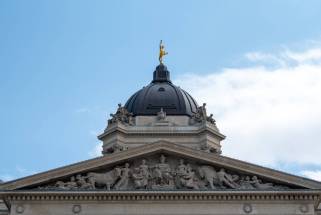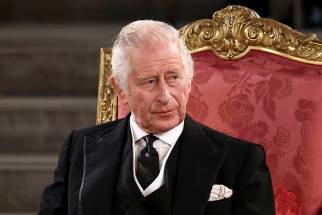New King must reaffirm monarchy’s relevance
Read this article for free:
or
Already have an account? Log in here »
To continue reading, please subscribe:
Monthly Digital Subscription
$0 for the first 4 weeks*
- Enjoy unlimited reading on winnipegfreepress.com
- Read the E-Edition, our digital replica newspaper
- Access News Break, our award-winning app
- Play interactive puzzles
*No charge for 4 weeks then price increases to the regular rate of $19.00 plus GST every four weeks. Offer available to new and qualified returning subscribers only. Cancel any time.
Monthly Digital Subscription
$4.75/week*
- Enjoy unlimited reading on winnipegfreepress.com
- Read the E-Edition, our digital replica newspaper
- Access News Break, our award-winning app
- Play interactive puzzles
*Billed as $19 plus GST every four weeks. Cancel any time.
To continue reading, please subscribe:
Add Free Press access to your Brandon Sun subscription for only an additional
$1 for the first 4 weeks*
*Your next subscription payment will increase by $1.00 and you will be charged $16.99 plus GST for four weeks. After four weeks, your payment will increase to $23.99 plus GST every four weeks.
Read unlimited articles for free today:
or
Already have an account? Log in here »
Hey there, time traveller!
This article was published 16/09/2022 (1178 days ago), so information in it may no longer be current.
While citizens of Britain and the Commonwealth countries continue to mourn the passing of Queen Elizabeth II, focus has begun to shift toward her eldest son, now known as King Charles III, and what his ascendence to the throne means to the monarchy’s immediate relevance and long-term survival.
While it’s too early to tell how the new King will fare as he seeks to follow in his mother’s imposing footsteps while at the same time redefining the monarchy to better suit current concerns, early indications are that the long decades spent observing the queen’s comportment have given him a fully formed understanding of what he must do now.
His first week on the job seems to have been generally well received — according to a YouGov survey conducted last week, the number of Britons who think Charles will be a “good king” sits at 64 per cent, a marked increase from the 32 per cent who expressed the same sentiment in May.
HENRY NICHOLLS / POOL / ASSOCIATED PRESS FILES King Charles III
His first public address as King undoubtedly contributed a great deal to the boost in public approval; so, certainly, did his decision to mingle — alongside wife Camilla, the Queen Consort — with the well-wishing public outside Buckingham Palace upon returning to London last week from Balmoral Castle in Scotland, where the queen died on Sept. 8.
Recent popularity upsurges notwithstanding, the challenge facing King Charles is a daunting one. While polls consistently showed support for Queen Elizabeth to be above 75 per cent — and often exceeding 80 per cent — public approval for the monarchy as an institution sits at slightly more than 60 per cent, with one survey showing support ranging from 77 per cent among those 65 and older to only 33 per cent for the 18-to-24 demographic and 56 per cent among those aged 25 to 49.
The new King must find a way to make the monarchy relevant to those younger groups — a task that will be made all the more difficult by the fact he, himself, is well into his golden years as he begins his reign.
The new King must find a way to make the monarchy relevant to those younger groups.
His mother assumed the throne when she was 27 (and Charles, her first-born, was three); at 73, he is the oldest person to become the “new” monarch. His elder son, Prince William — now heir to the throne — has passed his 40th birthday.
What remains to be seen is the manner in which Charles will choose to comport himself as King. A large part of his mother’s popularity was undoubtedly rooted in her determination to remain above the fray of politics and social unrest, choosing instead to maintain an air of detachment that many chose to perceive as dignity and stiff-upper-lip resolve.
Charles, on the other hand, opted for a more activist posture during his decades spent first in line to the throne. A champion of many causes, with a particular focus on environmental and climate-related issues, he has been vocal while the queen remained mostly mum.
What remains to be seen is the manner in which Charles will choose to comport himself as King.
While his first public address did include the observation that “It will no longer be possible for me to give so much of my time and energies to the charities and issues for which I care so deeply,” it’s hard to imagine he, as King, will be able to divorce himself completely from his long life’s passions.
Whether the public desires or will reject a monarch who insists on engaging directly in issues of concern remains to be seen.
Unlike his mother’s, the reign of King Charles will not span generations. How he chooses to spend his limited time as sovereign will go a long way toward determining whether Britain’s new King will be its last.














